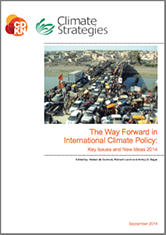The Way Forward in International Climate Policy: Key Issues and New Ideas 2014


Summary
As the United Nations Secretary General convenes a climate change summit in September 2014, and the world prepares for what hopefully will be major step forward in the UNFCCC meeting in Paris in 2015, it is clear that the urgency remains for further collective ambition and large-scale action to prevent dangerous anthropogenic interference with the climate system. The good news from the Working Group III contribution to the Intergovernmental Panel on Climate Change (IPCC) Fifth Assessment Report is that it is still possible to limit climate change to 2°C. The bad news, however, is that current action is inadequate for such a target. Moreover, the assessment of the literature in the international policy chapter of this IPCC report provides few new insights on how global climate policy can help find a way out of the current impasse over more stringent climate action (in mitigation and adaptation).
In May 2014, CDKN and Climate Strategies gathered leading climate change academics, policy-advisors and subject matter experts to address some of the critical deadlocks hampering climate negotiations, and to identify new economic, social and political ideas to move the debate forward. This publication, The Way Forward in International Climate Policy: Key Issues and New Ideas 2014, presents some of the ideas discussed during the event, the Global Climate Policy Conference. These range from the creation of climate ‘club goods’ to the role of green investment vehicles, technology and innovation in supporting mitigation and adaptation activities. This report also explores the social psychology of messaging and how this applies to our communications with the public and the private sector; and considers how personally held concepts of justice and equity might influence negotiations on adaptation, mitigation and loss and damage.
As scholars have proposed and argued in the past, the days of a single-issue climate treaty may be numbered. Climate change is just one junction in a complicated web of interwoven issues related to development, green growth, sustainability, equity and justice, trade, institutional structures, technology, investments and finance, innovation and competitiveness, to name but a few. Our hope is that these elements, as discussed in this publication, will tell a story that will make a difference in addressing climate change.
Suggested citation
Heleen de Coninck, Richard Lorch and Ambuj D. Sagar (Eds.). The Way Forward in International Climate Policy: Key Issues and New Ideas 2014. CDKN and Climate Stategies. CDKN, September, 2014.
(0) Comments
There is no content